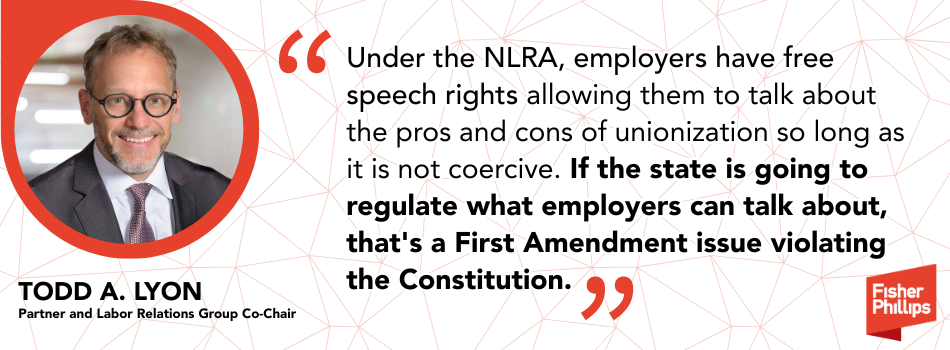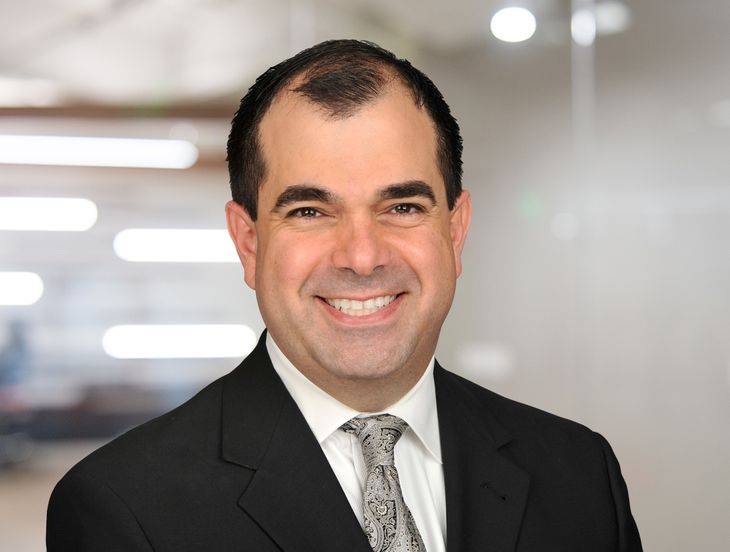California’s Captive Audience Ban Blocked: What Your Business Needs to Know
Insights
10.10.25
California employers can breathe easier when requiring staff to attend meetings regarding their position on unionization efforts – so-called “captive audience” meetings – following a federal court striking down a new Golden State ban on the practice. The September 30 decision, the first to find that state-level restrictions on captive audience meetings are preempted by federal labor law and violate the First Amendment, could provide a roadmap to challenge similar laws in other states. It also comes in the wake of the National Labor Relations Board’s ruling barring mandatory union education meetings late last year, a precedent which may be overturned once the nominees to the Board have been confirmed. What do businesses need to know about this decision, and what steps should you take as a result?
What Did the Law Do?
California’s SB 399, which went into effect January 1, barred employers from requiring staff to attend “employer-sponsored” meetings or to “participate in, receive, or listen” to any employer communications regarding “religious or political matters.” Businesses faced civil penalties from the state for retaliating against or taking adverse action against employees who refused to join such meetings. You can read more about the law here.
The law was passed shortly before the National Labor Relations Board issued its November 2024 ruling overturning Babcock & Wilcox, a decision that banned mandatory captive audience meetings at the federal level. So, until the Board has an opportunity to revisit this decision, employers are required to adhere to the Board case law prohibiting captive audience meetings.
California isn’t the first state to enact restrictions on mandatory union meetings. Connecticut, Maine, Minnesota, New York, Oregon, Rhode Island, Washington, Illinois, Vermont, are among other jurisdictions also have similar bans on the books.
Why Was California’s Ban Struck Down?
Judge Daniel Calabretta’s decision out of the Eastern District of California largely came down on SB 399’s restrictions on the content of the conversations and communications employers can have with their staff regarding unionization.
The law’s prohibition on discussing “political matters,” which included unionization, was overly broad, Calabretta ruled, because it barred all speech on those topics. Employers do have a right to express their views on unionization under the NLRA, so long as those communications aren’t “coercive.” By failing to distinguish between “coercive” and “non-coercive” speech, SB 399 threatened to interfere with employers’ right to discuss unionization in a “non-coercive” manner – which has been recognized by Congress through amendments to the National Labor Relations Act (NLRA).
The judge also rejected arguments that SB 399 regulated employers’ conduct, not their speech, because penalties would only be imposed if employers took adverse action against an employee. In order to enforce the law, it would require referencing back to the content of the employer’s speech to determine whether the employment decision was permitted, Calabretta wrote.
“Under the NLRA, employers have free speech rights allowing them to talk about the pros and cons of unionization so long as it is not coercive,” said Todd Lyon, Co-Chair of the Fisher Phillips Labor Relations Practice Group and partner in the Portland and San Francisco offices. “So, the Court made the right ruling based on federal labor law principles. Further, if the state is going to regulate what employers can talk about, that's a First Amendment issue violating the Constitution.”
What Does This Ruling Mean for Employers?
The decision out of California could provide support for other legal challenges to similar state and local efforts to overreach into federal labor law, potentially slowing down the growing patchwork of these laws across the country.
For now, businesses “can rest assured that they don't have to worry about conforming to California's latest iteration of labor relations requirements versus how they’re going to comply with the same labor relations policy in New York,” said Lyon.
There's still one system of labor relations, and that's governed by the National Labor Relations Act, said Lyon, who represented the California Chamber of Commerce in the case before the U.S. District Court for the Eastern District of California, along with Lonnie Giamela, a partner in both the Los Angeles and Irvine offices.
What Should Employers Do Now?
Given the anticipated changes at the Board and the recent ruling out of California, employers can feel more confident to launch preemption and First Amendment challenges to state and local efforts to legislate federal labor law. Companies should consult with their FP counsel about the evolving legal landscape regarding labor relations.
Conclusion
We will continue to monitor developments in this area as they unfold, and would encourage readers to consult with their FP counsel for additional guidance in this rapidly evolving legislative arena. Make sure you are subscribed to Fisher Phillips’ Insight System to get the most up-to-date information direct to your inbox. For further information, contact your Fisher Phillips attorney, the authors of this Insight, or any member of our Labor Relations group.
Related People
-
- Lonnie D. Giamela
- Partner
-
- Todd A. Lyon
- Partner and Labor Relations Group Co-Chair

